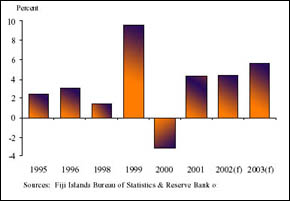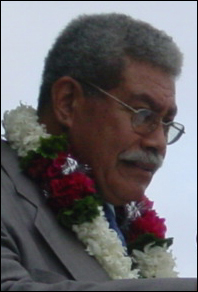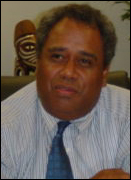
 INTRODUCTION INTRODUCTION |
An air of excitement has descended on the tropical
island of Fiji in the Pacific and it is not only
because the country will be hosting the region's
12th South
Pacific Games in June this year. While the bringing
together of 5,000 athletes and officials at a games
budget and investment that is running into $100
million FJD (@ $50m USD), there are other reasons
for the feeling of enthusiasm and optimism in this
island nation. After an impressive economic growth
rate of 4.4 percent in 2002, the country is now
bracing for an almost 6 percent growth for 2003.
To achieve this, the Fiji government, which is being
led by a former banker as Prime Minister, intends
to raise investment levels from the current low
of 11 percent to 25 percent of its Gross Domestic
Product.
 Fiji,
Back In Business Investment in this South Pacific
nation has been lethargic at best. To show its seriousness
in achieving its targeted growth, the government
has been investing heavily in capital development.
For 2003 alone, this amounted to $240 million FJD
(@ $120m USD), some 20 percent of its total expenditure.
Now the private sector is taking up the cue with
the powerful employers' bloc, the Fiji Employers
Federation, estimating proposed investment in Fiji
at about $1 billion FJD (@ $500m USD). Such an ambitious
plan is a far cry from the severe battering the
Fiji economy had suffered from three coups, two
in 1987 and another in 2000. Investors fled in droves
and the country's professionals followed, emigrating
in worrying numbers, mainly to Australia, New Zealand
and North America. Fiji,
Back In Business Investment in this South Pacific
nation has been lethargic at best. To show its seriousness
in achieving its targeted growth, the government
has been investing heavily in capital development.
For 2003 alone, this amounted to $240 million FJD
(@ $120m USD), some 20 percent of its total expenditure.
Now the private sector is taking up the cue with
the powerful employers' bloc, the Fiji Employers
Federation, estimating proposed investment in Fiji
at about $1 billion FJD (@ $500m USD). Such an ambitious
plan is a far cry from the severe battering the
Fiji economy had suffered from three coups, two
in 1987 and another in 2000. Investors fled in droves
and the country's professionals followed, emigrating
in worrying numbers, mainly to Australia, New Zealand
and North America.

But Prime
Minister Laisenia Qarase and his government
believe the negative trend has been arrested and
figures are beginning to show a turnaround. Prime
Minister Qarase believes the policies his government
have put in place are pro-investors and the climate
to invest in Fiji has never been better. "The
Foreign Investment Act that became law a few years
back has some deficiencies and we have taken the
opportunity to review it so that we strengthen the
legislation with the aim of attracting more and
more FDI into the country," says Qarase.
"Our 2003 Budget is pro business but it
is also pro poor and pro rural. There is a lot in
the budget to strengthen the business sector but
there are also a lot of programmes that work towards
alleviating poverty."

Savenaca Narube,
Governor of the Reserve Bank
of Fiji was among those that drew up an economic
recovery plan. Fiji, he said, was never in any threat
of a financial crisis during and after the coup,
which would normally be the sequence of events in
such a crisis. "When a political crisis
happens the next thing you see is a financial crunch,
and that never happened here. That is the best message
we could send to safeguard financial stability,"
Narube explains. Fiji's
Foreign and External Trade Minister, Kaliopate Tavola,
explains the current situation: "The economy
now is almost 100% recovered. We have maintained
financial stability and the figures for economic
growth are looking very promising. We are looking
at a 5% or 6% this year and another positive growth
in the year 2004". Explaining how the turnaround
came about, the head of the Fiji
Trade and Investment Bureau, the trade and investment
agency of government, Jesoni
Vitusagavulu says a lot of the Bureau's
efforts were about testifying that Fiji had a good
record bouncing back very strongly after a political
turmoil. "If you look at this country's
economic record you will realise that some of the
best economic performances in Fiji's independent
history took place during the five-year period after
1987. This shows the relative resilience of our
economy," Vitusagavulu said. |
 The
feeling of optimism in this island nation is evident
despite the pending result of an important court
decision at which the legality of the Fiji Government
is being questioned. Fiji's independent Supreme
Court presided by a panel of overseas judges will
in June hear and rule on an appeal by Prime Minister
Qarase: that two lower courts erred in law in declaring
his cabinet unconstitutional. The plaintiff is Qarase's
predecessor, Mahendra Chaudhry and leader of the
second largest party in parliament, the Fiji Labour
Party. At issue is the multi-party cabinet provision
of Fiji's constitution, which Qarase has labelled
as impractical and unrealistic. He has however given
the assurance that his government will deem the
pending Supreme Court decision as final and will
abide by it. The
feeling of optimism in this island nation is evident
despite the pending result of an important court
decision at which the legality of the Fiji Government
is being questioned. Fiji's independent Supreme
Court presided by a panel of overseas judges will
in June hear and rule on an appeal by Prime Minister
Qarase: that two lower courts erred in law in declaring
his cabinet unconstitutional. The plaintiff is Qarase's
predecessor, Mahendra Chaudhry and leader of the
second largest party in parliament, the Fiji Labour
Party. At issue is the multi-party cabinet provision
of Fiji's constitution, which Qarase has labelled
as impractical and unrealistic. He has however given
the assurance that his government will deem the
pending Supreme Court decision as final and will
abide by it.

Shedding Bureaucracies Through Corporatisation.The
Fiji Government has a public sector reform programme
that has seen a number of selected public enterprises
undergone corporatisation and privatisation. The
programme has seen government bodies being turned
into public companies. Telecom Fiji and Post Fiji
are case in point as well as Airports Fiji Limited,
Ports Terminal Limited, Land Transport Authority,
Fiji Hardwood Limited and Fiji Pine Limited. Some
of these companies have quickly learnt the ropes,
of the new way of doing business and being customer
and service oriented. Quite a number have developed
into multi-million dollar businesses, helped in
no small measure of course by the exclusive licence
they have negotiated for themselves. This is especially
true for Telecom Fiji, Post Fiji, Airports Fiji
Limited and Land Transport Authority. The financial
performance of enterprises monitored by the ministry
of Public Enterprises has improved steadily. They
made a combined Net Profit after Tax of $11.7 million
FJD in 2001. They paid taxes of $1.6 million FJD
in 2000 and $1.7 million FJD in 2001 and also paid
dividends of $1.6 million FJD in 2000 and $1.9 million
FJD in 2001. The reform objectives are to ensure
the efficiency of the enterprises and because of
their strategic importance they contribute directly
to the cost of doing business in Fiji. Mr.
Irami Matairavula, Minister for Public Enterprises
and Public Sector Reform says that "the
efficiency of the Ports and Airports, availability
of air freight cargo spaces, effective water and
power supplies as well as the overall standard of
infrastructure in the country are some of the fundamentals
for increased investment." Concerning the
Government policy on the privatization of national
strategic assets, Matairavula says Qarase's cabinet
"considers privatization cautiously and
Parliamentary approval is required. Nevertheless,
foreign participation as strategic partners in our
enterprises will be always welcomed as they bring
in technical and management expertise required to
improve operations of the enterprises as well as
the finance to adequately capitalize them."
The country's international carrier Air Pacific
has undergone a successful privatisation exercise.
Australian airline QANTAS now owns 46 percent shares
in the company. Previous governments had expressed
their interests in injecting the corporate culture
in other industries like power, water, printing
and government supplies.
|

